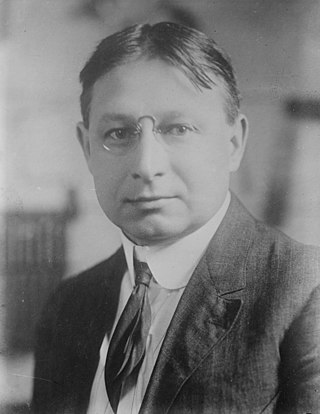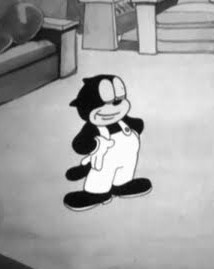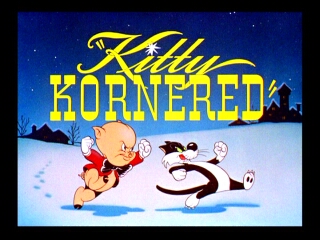
Star Trek: The Animated Series (TAS) is an American animated science fiction television series created by Gene Roddenberry. It originally aired under the title simply as Star Trek, subtitled Created by Gene Roddenberry, on Saturday mornings from September 8, 1973, to October 12, 1974, on NBC, spanning 22 episodes over two seasons. The second series in the Star Trek franchise, it features mostly the same characters as Star Trek: The Original Series. Set in the 23rd century, the series follows the further adventures of the Starship USS Enterprise as it explores the galaxy.

The Rolling Stones is a 1952 science fiction novel by American writer Robert A. Heinlein.

The guinea pig or domestic guinea pig, also known as the cavy or domestic cavy, is a species of rodent belonging to the genus Cavia in the family Caviidae. Breeders tend to use the word cavy to describe the animal, while in scientific and laboratory contexts, it is far more commonly referred to by the common name guinea pig. Despite their common name, guinea pigs are not native to Guinea, nor are they closely related biologically to pigs, and the origin of the name is still unclear. They originated in the Andes of South America. Studies based on biochemistry and hybridization suggest they are domesticated animals that do not exist naturally in the wild, descendants of a closely related cavy species such as C. tschudii. They were originally domesticated as livestock for a source of meat, and are still consumed in some parts of the world.

Isadore "Friz" Freleng, credited as I. Freleng early in his career, was an American animator, cartoonist, director, producer, and composer known for his work at Warner Bros. Cartoons on the Looney Tunes and Merrie Melodies series of cartoons. In total he created more than 300 cartoons.

David Gerrold is an American science fiction screenwriter and novelist. He wrote the script for the original Star Trek episode "The Trouble with Tribbles", created the Sleestak race on the TV series Land of the Lost, and wrote the novelette "The Martian Child", which won both Hugo and Nebula Awards, and was adapted into a 2007 film starring John Cusack.

"The Trouble with Tribbles" is the fifteenth episode of the second season of the American science fiction television series Star Trek. Written by David Gerrold and directed by Joseph Pevney, it was first broadcast on December 29, 1967. In this comic episode, the starship Enterprise visits a space station that soon becomes overwhelmed by rapidly reproducing small furry creatures called "tribbles."

Ellis Parker Butler was an American author. He was the author of more than 30 books and more than 2,000 stories and essays and is most famous for his short story "Pigs Is Pigs", in which a bureaucratic stationmaster insists on levying the livestock rate for a shipment of two pet guinea pigs, which soon start proliferating exponentially. His most famous character was Philo Gubb.
In Robert A. Heinlein's 1952 science fiction novel, The Rolling Stones, flat cats are a species of Martian animal which reproduce rapidly and overrun a spaceship.
"Pigs Is Pigs" is a story by American writer Elis Parker Butler, first published in 1905.

Beans the Cat is an animated cartoon character in the Warner Bros. Cartoons series of cartoons from 1935–1936. Beans was the third Warner Bros cartoon character star after Bosko and Buddy. He is voiced by Billy Bletcher and occasionally by Tommy Bond. He was created by director Friz Freleng. The character was featured in nine cartoons made in 1935 and 1936.

Scaredy Cat is a 1948 Warner Bros. Merrie Melodies cartoon directed by Chuck Jones. The short was released on December 18, 1948, and stars Porky Pig and Sylvester the Cat. The cartoon is notable in that it marks the first time the name "Sylvester" is used for the popular feline character. In previous shorts, the cat is unnamed, except for in the 1947 cartoon Tweetie Pie in which he is referred to as "Thomas".

Kitty Kornered is a 1946 Warner Bros. Looney Tunes cartoon, directed by Robert Clampett. The short was released on June 8, 1946, and stars Porky Pig and Sylvester.
Warner Bros. Cartoons, Inc. was an American animation studio, serving as the in-house animation division of Warner Bros. during the Golden Age of American animation. One of the most successful animation studios in American media history, it was primarily responsible for the Looney Tunes and Merrie Melodies series of animated short films. The characters featured in these cartoons, including Bugs Bunny, Daffy Duck, and Porky Pig, are among the most famous and recognizable characters in the world. Many of the creative staff members at the studio, including directors and animators such as Chuck Jones, Friz Freleng, Robert McKimson, Tex Avery, Robert Clampett, Arthur Davis, and Frank Tashlin, are considered major figures in the art and history of traditional animation.
John Ryan Kinney was an American animator, director and producer of animated shorts. Kinney is the older brother of fellow Disney animator Dick Kinney.

The Metro-Goldwyn-Mayer cartoon studio was an American animation studio operated by Metro-Goldwyn-Mayer (MGM) during the Golden Age of American animation. Active from 1937 until 1957, the studio was responsible for producing animated shorts to accompany MGM feature films in Loew's Theaters, which included popular cartoon characters Tom, Jerry, Droopy, Butch, Spike, Tyke, and Barney Bear.

Spike and Tyke are fictional characters from the Tom and Jerry animated film series, created by William Hanna and Joseph Barbera. Spike is portrayed as an English Bulldog, who is generally amiable and friendly, and a loving father to his son Tyke in several episodes. However, Spike's character also has a very stern, and fierce side, for occasions such as when he is defending his son Tyke.

Pigs Is Pigs is a 1954 animated film by Walt Disney Studios. Based on the story "Pigs Is Pigs" by Ellis Parker Butler, it relates the tale of a railway agent and his problems with a shipment of two guinea pigs that proceed to breed rapidly. The cartoon was animated in the flat, colorful UPA style. The melody of the traditional Irish jig "The Irish Washerwoman" is repeated throughout the short.

Tribbles are a fictional alien species in the Star Trek universe. They were conceived by screenwriter David Gerrold and first appeared in 1967, in the fifteenth episode of the second season of Star Trek: The Original Series, titled "The Trouble with Tribbles". They are depicted as a small, furry, gentle, cute and slow-moving, but rapidly reproducing, lovable species. Though they appear infrequently on-screen, they have become a popular feature of the Star Trek universe, featuring in their own eponymous official card game, and even lending their name to a conserved family of proteins that was first identified in the fruit fly as a regulator of cell division.
The Farm of Tomorrow is a 1954 one-reel animated short subject directed by Tex Avery and produced by Fred Quimby. It was released theatrically with the feature filmmovie Rogue Cop on 18 September 1954 and distributed by Metro-Goldwyn-Mayer.
Traffic Troubles is a Mickey Mouse short animated film first released on March 7, 1931, as part of the Mickey Mouse film series. It was the twenty-sixth Mickey Mouse short to be produced, and the second of 1931.













